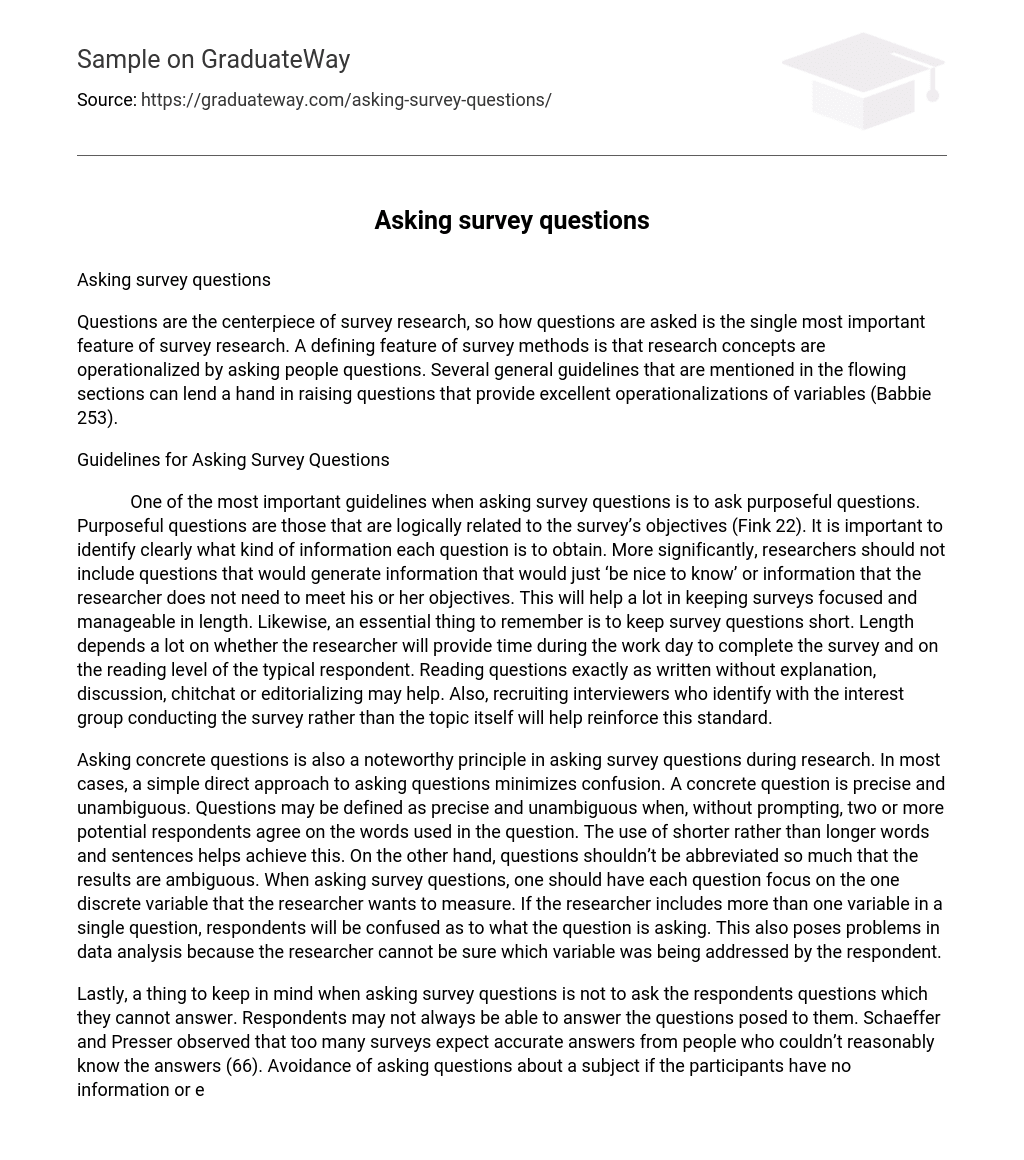Questions are the centerpiece of survey research, so how questions are asked is the single most important feature of survey research. A defining feature of survey methods is that research concepts are operationalized by asking people questions. Several general guidelines that are mentioned in the flowing sections can lend a hand in raising questions that provide excellent operationalizations of variables (Babbie 253).
Guidelines for Asking Survey Questions
One of the most important guidelines when asking survey questions is to ask purposeful questions. Purposeful questions are those that are logically related to the survey’s objectives (Fink 22). It is important to identify clearly what kind of information each question is to obtain. More significantly, researchers should not include questions that would generate information that would just ‘be nice to know’ or information that the researcher does not need to meet his or her objectives. This will help a lot in keeping surveys focused and manageable in length. Likewise, an essential thing to remember is to keep survey questions short. Length depends a lot on whether the researcher will provide time during the work day to complete the survey and on the reading level of the typical respondent. Reading questions exactly as written without explanation, discussion, chitchat or editorializing may help. Also, recruiting interviewers who identify with the interest group conducting the survey rather than the topic itself will help reinforce this standard.
Asking concrete questions is also a noteworthy principle in asking survey questions during research. In most cases, a simple direct approach to asking questions minimizes confusion. A concrete question is precise and unambiguous. Questions may be defined as precise and unambiguous when, without prompting, two or more potential respondents agree on the words used in the question. The use of shorter rather than longer words and sentences helps achieve this. On the other hand, questions shouldn’t be abbreviated so much that the results are ambiguous. When asking survey questions, one should have each question focus on the one discrete variable that the researcher wants to measure. If the researcher includes more than one variable in a single question, respondents will be confused as to what the question is asking. This also poses problems in data analysis because the researcher cannot be sure which variable was being addressed by the respondent.
Lastly, a thing to keep in mind when asking survey questions is not to ask the respondents questions which they cannot answer. Respondents may not always be able to answer the questions posed to them. Schaeffer and Presser observed that too many surveys expect accurate answers from people who couldn’t reasonably know the answers (66). Avoidance of asking questions about a subject if the participants have no information or experience upon which to formulate an accurate response greatly aids in following this important guideline. Another reason why people typically cannot answer a question is that they may not remember. Despite these reasons, respondents may provide answers, but those answers will be misleading.
How the Guidelines Might be Violated
Examples of how the aforementioned guidelines may be violated will be discussed. If the introduction to the researcher’s survey says that the survey relates to, for instance, the last service transaction and the researcher asks unrelated questions, it will not only violate the first guideline of asking purposeful questions; it will also annoy the respondent – who are the most important resource of a social research, after all. Also, this will negatively affect response rates in the long run.
Similarly, when a researcher extends the survey question to compound and/or complex sentences requiring the respondent to allocate time for the survey to more than 30 minutes, it is already a violation of two of the previous guidelines: that of keeping survey questions short and asking concrete (precise and unambiguous) questions.
WORKS CITED (MLA)
1. Babbie, Earl. The Basics of Social Research. Belmont, California: Thomson Wadsworth, 2005.
2. Fink, Arlene. The Survey Kit. Thousand Oaks, California: Sage Publications, Inc., 2003.
3. Schaeffer, Nora Cate and Stanley Presser. “The Science of Asking Questions.” Annual Review of Sociology. 29: 65+.





